








FILE – In this March 31, 2020, file photo, New York City Mayor Bill de Blasio speaks to the media in New York. (AP Photo/Frank Franklin II, File)
The mayor of New York City faced backlash from the state’s largest teachers union after canceling a compensation payout. On Friday, Mayor Bill de Blasio announced the coronavirus pandemic forced him to freeze $900 million in teacher back pay.
A 2014 union agreement declared teachers would receive 12% to 25% of the amount owed to them between 2009 and 2015. The last payment was due this month.
United Teachers Federation President Michael Mulgrew slammed the city for “waiting until the last minute” and stated the union will go directly to arbitration.
“We all understand that we’re in a pandemic, that our economy has basically been wrecked both here in the city, the state and nationally,” he said. “But this is money we have already earned from over 10 years ago, and the city needs to make good on their obligation.”
In the meantime, the mayor has insisted the payments were not canceled and will be given at a later date.

New York City Mayor Bill De Blasio has come under fire from a local principals union who has asked him to step away from his duties to reopen schools.
On Sunday, the city’s Council of School Supervisors and Administrators unanimously passed a vote of ‘no confidence’ against De Blasio, just days before schools are set to reopen.
Members of the union said the mayor’s office has made too many mistakes in recent months and are not prioritizing students or their families.
“It seems like all summer long we’ve been running into roadblock after roadblock,” stated Mark Cannizzaro, President of the Council of School Supervisors and Administrators. “With changing guidance, confusing guidance…any decision that should’ve been needed to be made, should’ve been made well before the opening of school.”
The move comes amid a massive teacher shortage, where more than 200 K-8 grade schools need 1,200 teachers. Reports show De Blasio was made aware of the shortage back in May and failed to listen to an advisory board put in place to help handle the issue.
Since then, city officials and teachers unions have made deals to delay the start of in-person classes without giving the principals union enough notice.
Meanwhile, the union is asking the New York State Department of Education to step in to oversee safe school reopenings. Some middle schools along with every high school are expected to administer in-person classes starting as soon as Thursday. Yet, school supervisors are worried they won’t be able to stay open very long.

FILE – In this Sept. 9, 2020, file photo, students wear protective masks as they arrive for classes at the Immaculate Conception School while observing COVID-19 prevention protocols in The Bronx borough of New York. (AP Photo/John Minchillo, File)

The confirmation hearing for Amy Coney Barrett, President Trump's pick for the Supreme Court, will kick off Monday, where she's expected to be grilled on several hot-button issues that would have a far-reaching impact.
Supreme Court nominees routinely won't say how they'll rule on particular issues to prevent prejudging a potential case, but lawmakers on the Senate Judiciary Committee are expected to target her past writings and statements -- and press Barrett on how those past communications might impact her judicial thinking on such issues as abortion, gun ownership, health care and more.
Unlike Trump's previous two nominees -- Justices Neil Gorsuch and Brett Kavanaugh, who replaced conservative-leaning justices -- Barrett's ascension to the court would have a big ideological impact because she would succeed liberal icon Justice Ruth Bader Ginsburg, who died Sept. 18 at age 87.
Barrett's addition to the bench would forge a 6-3 conservative majority on a Supreme Court that for decades has had a 5-4 conservative edge, which liberals could occasionally upend by attracting a vote from across the ideological divide.
Democrats have opposed Barrett because of the timing of nomination -- just weeks before the presidential election -- and because they believe she would vote against their political priorities, including the Affordable Care Act and abortion access.
Meanwhile, Republicans have touted Barrett's qualifications for the job, her practice of honoring the original meaning of the Constitution, and her judicial likeless to a conservative hero, the late Justice Antonin Scalia, for whom Barrett clerked and considers a mentor.
Here's a look at the top issues that will be in the spotlight during Barrett's hearing.
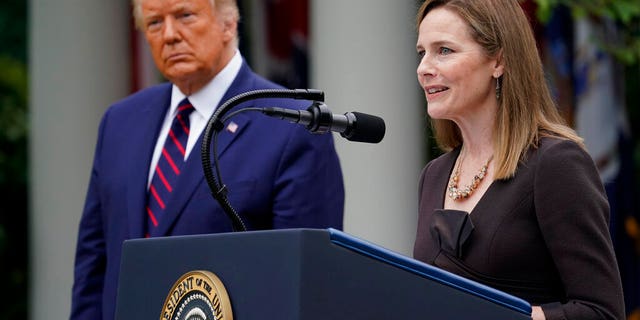
Judge Amy Coney Barrett speaks after President Donald Trump announced Barrett as his nominee to the Supreme Court, in the Rose Garden at the White House, Saturday, Sept. 26, 2020, in Washington. (Associated Press)
ABORTION
Anti-abortion groups have championed Barrett's nomination, while pro-choice activists have fiercely opposed her -- both believing she could be a vote to overturn or chip away at Roe v. Wade, the landmark 1973 case that gave women a legal right to terminate a pregnancy.
Barrett, a Roman Catholic, has been actively pro-life in her personal life, signing onto a two-page ad in 2006 to oppose abortion that called Roe v. Wade's legacy "barbaric" and declared life begins at "fertilization."
And in new documents disclosed late Friday that Barrett turned over to the Senate Judiciary Committee, Barrett joined fellow pro-life faculty at the University of Notre Dame in signing a 2013 newspaper advertisement to oppose the "infamous" Roe v. Wade ruling and to "call for the unborn to be protected in law and welcomed in life."
As a jurist on the Seventh Circuit Court of Appeals for just under three years, Barrett has encountered only a few abortion cases.
In one 2018 case, the Seventh Circuit affirmed a lower court decision to strike down an Indiana law, signed by then-Gov. Mike Pence, that would have outlawed abortions that were based on the race, sex or disability of the fetus and would require the dignified disposal of human fetal remains. Barrett disagreed and joined with the dissent, written by Judge Frank Easterbrook, that viewed the Indiana statute as "an anti-eugenics law."
The case went to the Supreme Court which in 2019 issued orders with mixed results -- allowing the fetal tissue disposal portion of the Indiana law to take effect but not allowing Indiana to enact the new abortion restrictions on race, sex or disability.
While Trump has previously pledged he'd appoint only "pro-life judges," the White House has insisted Barrett would apply the law and not her personal beliefs.
"The president has been clear that he would never ask a judge to prejudge a case,” White House press secretary Kayleigh McEnany said. “Judge Amy Coney Barrett has on multiple occasions said it is never appropriate for a judge to impose that judge’s personal convictions whether they derive from faith or anywhere else in the law.”
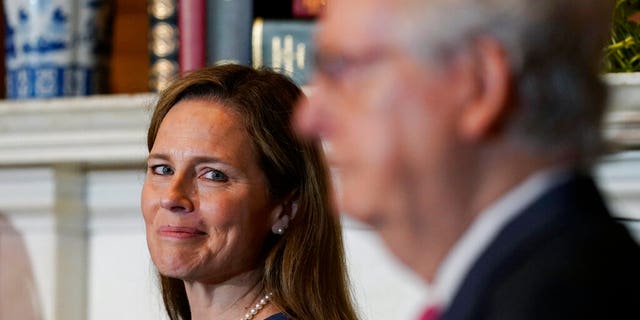
Supreme Court nominee Judge Amy Coney Barrett looks over to Senate Majority Leader Mitch McConnell of Ky., as they meet with on Capitol Hill in Washington, Tuesday, Sept. 29, 2020. (Associated Press)
HEALTH CARE
The Affordable Care Act, also known as ObamaCare, will be front-and-center during Barrett's confirmation hearing because the Supreme Court is slated to hear a challenge to the Obama-era health care law on Nov. 10 in a case known as California v. Texas.
If Barrett is confirmed before Nov. 3 -- the goal of Senate Republicans -- she could potentially be in place to hear the case and determine the survival of the health law that was designed to decrease the number of uninsured people in America, in part, by requiring that almost everyone have insurance.
A coalition of red states aims to invalidate the ACA on the grounds that this individual mandate -- which was upheld by the Supreme Court previously as a tax -- is now unconstitutional because Congress eliminated the financial penalty associated with not purchasing health insurance.
They say this makes it impossible to read the ACA as a tax anymore, so it is now simply an unconstitutional government mandate to purchase a certain product. The Trump administration is backing the red states' position in the lawsuit.
Democrats believe Barrett would vote against the Affordable Care Act because her mentor, Scalia, did twice before. At the White House nominating ceremony Sept. 26, Barrett made a point to say she shares the same philosophy as Scalia that a judge must apply the law as written and not make policy.
"His judicial philosophy is mine too," Barrett said.
Barrett was critical of Chief Justice John Roberts for joining the liberal wing of the court in the 2012 case NFIB v. Sebelius that upheld the Affordable Care Act by a 5-4 decision. She wrote in a 2017 essay that Roberts “pushed the Affordable Care Act beyond its plausible meaning to save the statute.”
She publicly sided with the dissent, written by Scalia, in another Supreme Court case that upheld ObamaCare, known as King v. Burwell.
"The dissent has the better of the legal argument," Barrett said in an NPR interview after the ruling.
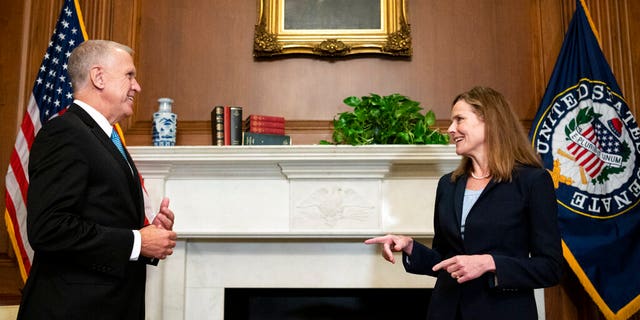
Sen. Thom Tillis, R-N.C., meets with Judge Amy Coney Barrett, President Donald Trump's nominee to the Supreme Court, at the U.S. Capitol, Sept. 30, 2020, in Washington. (Associated Press)
GUN RIGHTS
Gun rights groups like the National Rifle Association and Gun Owners of America have expressed support for Barrett, while gun control advocates have opposed her nomination, viewing her as an opponent to laws that restrict gun ownership.
Unlike health care, Barrett does have a record on guns from the Seventh Court that has informed her critics and supporters' opinions on how she views infringements on the Second Amendment constitutional right to bear arms.
In the 2019 gun-rights case Kanter v. Barr, Barrett wrote a dissenting opinion that argued that a conviction for a nonviolent felony — in this case, mail fraud — shouldn’t automatically disqualify someone from owning a gun. She said the government had failed to introduce data "to show that disarming all nonviolent felons substantially advances its interest in keeping the public safe."
In that same opinion, she also reaffirmed that states can take away voting rights from felons.
Barrett wrote that "the Second Amendment confers an individual right, intimately connected with the natural right of self defense, and not limited to civic participation."
Democrats wanting stricter gun control legislation in the wake of America's painful history of mass shootings have come out strongly against Barrett based, in part, on this opinion.
“Amy Coney Barrett is a radical," said Sen. Chris Murphy, D-Conn. "She is seeking a position on the Supreme Court to legislate her radical views into existence, and when 90% of Americans want felons to be kept from buying guns, it is unfathomable that we would consider putting somebody on the Court who is going to strike down that restriction."
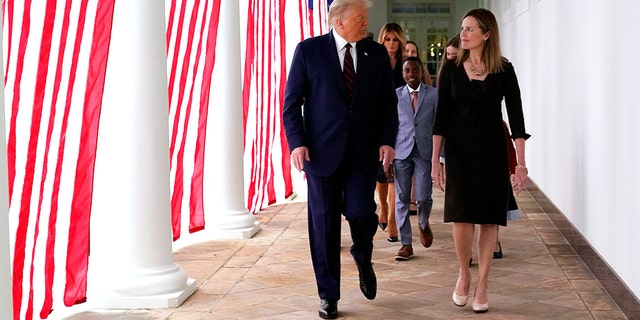
President Donald Trump walks along the Colonnade with Judge Amy Coney Barrett after a news conference to announce Barrett as his nominee to the Supreme Court, in the Rose Garden at the White House, Sept. 26, 2020, in Washington. (Associated Press)
But Republicans have praised Barrett as a principled constitutionalist and a brilliant jurist.
"The left's apocalyptic rhetoric will seem extra nutty when Americans hear from Judge Barrett at her confirmation hearings," said Sen. Ben Sasse, R-Neb.
CAMPUS SEXUAL ASSAULT
Barrett wrote a unanimous three-judge panel decision in 2019 making it easier for men alleged to have committed sexual assaults on campus to challenge the proceedings against them.
The case, Doe v. Purdue University, involved a student who had been found guilty of sexual violence by Purdue University's disciplinary system, suspended for an academic year and lost out on his ROTC scholarship. The student, known as John Doe, sued and alleged sex discrimination.
Barrett sided with the male student and questioned how the university came to favor the female student, known as Jane Doe.
"In a case that boiled down to a 'he said/she said' it is particularly concerning that [the university] concluded that Jane was the more credible witness — in fact, that she was credible at all — without ever speaking to her in person," Barrett wrote.
She wrote: "Purdue’s process fell short of what even a high school must provide to a student facing a days-long suspension."
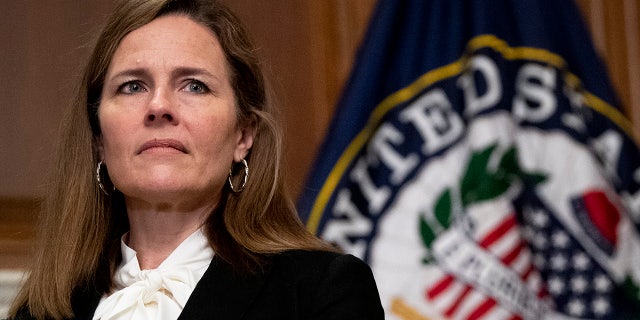
Supreme Court nominee Judge Amy Coney Barrett, meets with Sen. Joni Ernst, R-Iowa, not shown, Thursday, Oct. 1, 2020, at the Capitol in Washington. (Associated Press)
IMMIGRATION
Barrett has handled a few immigration cases on the Seventh Circuit Court, including one where she sided with the Trump administration in a dissent.
In
June 2020, a three-judge panel on the Seventh Circuit upheld an order
blocking a new Trump immigration rule from being enforced. The so-called
"public charge" rule allows immigration officials to deny green cards
to legal immigrants over their use of public benefits.
But Barrett dissented in the case, Cook County v. Wolf, and wrote that while critics have considered the public charge definition "too harsh," the "same can be said" of laws passed by Congress.
"Litigation is not the vehicle for resolving policy disputes," Barrett wrote. "Because I think that [the Department of Homeland Security's] definition is a reasonable interpretation of the statutory term 'public charge.' I respectfully dissent."
If confirmed, Barrett, 48, would become the fifth woman to earn a lifetime appointment to the Supreme Court and would cement its conservative tilt.
Fox News' Tyler Olson, Hollie McKay and The Associated Press contributed to this report.

President Trump added Pennsylvania and Iowa to his campaign schedule next week, stepping up travel plans despite his recent bout with coronavirus.

Trump will hold nighttime rallies in Johnstown, Pa., on Tuesday and Des Moines, Iowa, on Wednesday to shore up support in the battleground states before the Nov. 3 election, his campaign announced Saturday.
That's on top of a previously announced stop in Sanford, Fla., on Monday and a law and order event Saturday at the White House -- his first public event since leaving the hospital.
Trump was admitted to Walter Reed National Military Medical Center with serious symptoms last Friday, began a course of treatment, and returned to the White House Monday.
Meanwhile, Joe Biden and his campaign called Trump's conduct since he was diagnosed with coronavirus "reckless." They accused him of putting those around him needlessly at risk.
"His reckless personal conduct since his diagnosis, the destabilizing effect it's having on our government, is unconscionable," Biden said Friday.
The White House has not yet released when Trump's last negative COVID-19 was or evidence that he is no longer contagious.

On Thursday, White House physician Dr. Sean Conley sent out a memo stating that Trump could resume public engagements beginning Saturday.
But there hasn't been information from Trump's doctor's since, such as a note clearing him for travel or details on his health.
Trump this week, said he's feeling good and is off medication. Trump received cutting-edge treatments that are not widely available to Americans.
In his first TV interview from the White House since announcing he contracted coronavirus Oct. 2, Trump told Dr. Marc Siegel on "Tucker Carlson Tonight" that he was “medication-free” as of Friday and feeling "really, really strong."
Trump said he was tested for coronavirus on Friday and did not know the exact results, but he was “either the bottom of the scale or free” of the virus. He expected to be tested again Saturday.
The president added that he would donate plasma to help other patients if asked.

Fox News' Thomas Barrabi contributed to this report.

One person was shot and killed, and a local news station's private security guard was in custody Saturday evening after protests between opposing groups turned violent in Denver's Civic Center Park, city police said.
The man who was shot was part of a pro-police "Patriot Rally," according to a report.
"Further investigation has determined the suspect is a private security guard with no affiliation with Antifa," the Denver Police Department wrote in a Twitter message.
KUSA-TV, a local Denver news station also known as 9NEWS, reported that a suspect in police custody was a private security guard hired by the station.
"The private security guard was contracted through Pinkerton by 9NEWS," the news outlet wrote. "It has been the practice of 9NEWS for a number of months to hire private security to accompany staff at protests."
A KUSA producer also was initially in custody, but has since been released.
Video of the incident shows one shot being fired. Denver police then quickly cordon off the scene, giving medical aid to the victim and arresting a suspect.
"There was a verbal altercation that transpired. A firearm was discharged," Joe Montoya, Denver Police chief of investigations said. "An individual was shot and later pronounced deceased. There were two guns recovered at the scene."
The shooting victim had participated in a pro-police rally, the Denver Post reported.
"The incident occurred after a man participating in what was billed a 'Patriot Rally' sprayed mace at another man. That man then shot the other individual with a handgun near the courtyard outside the Denver Art Museum," the newspaper reported.
Denver police said they had one suspect in custody and were investigating the incident as a homicide.
Police had a large presence at the protests to keep opposing protesters calm.
"There was a large presence because we had two groups with opposing views, and we know that can always get very tense," Montoya said. "There’s always potential for violence, we understand that. We had a large contingent there to try to watch the egress of one group, so that the other group wouldn’t intermingle with them, so that’s the reason for the large presence there."
One side of the protests was characterized as a "Black Lives Matter Anti-Fascist Soup Drive" on Facebook. Some of the groups attending were Denver Communists, Colorado Socialist Revolution, Anon Resistance Movement, W.I.T.C.H. Denver, H.O.E.S (Help on Every Street), and Front Range Mutual Aid Network.
On the other side, pro-police groups organized a "Patriot Muster," local news outlet Westword reported.
“We scheduled our action after learning that the militia-fascists had called a ‘patriot muster’ against the Black Lives Matter movement, anti-fascists and Marxists,” a representative for Denver Communists told Westword. “That’s us — guilty as charged and happy to oblige with our presence.”
 |
| Last month, the host of "The Ben Shapiro Show" packed his bags from Los Angeles and moved to Nashville, Tenn. |
"Real Time" host Bill Maher took a moment on his show Friday night to slam his Democrat-controlled home state of California and sound the alarm over the "exodus" that is taking place.
During an interview with Rep. Adam Schiff, D-Calif., Maher acknowledged that local issues were not in the congressman's "domain" but said he still felt the need to "b---- a little bit."
"There is an exodus," Maher said before reading from his notecard.
"California businesses are leaving the state in droves. In just 2018 and 19, which were economic boom years, 765 commercial facilities left, 13,000 between 2009 and 2016."
He continued, "Look, I came out here in 1983. I found paradise. I love California. I do. I don't want to leave, but I feel like I’m living in Italy in the 70s or something. Super high taxes, potholes in the road, fires. I don’t know what I’m getting for my super-high taxes."
The HBO star circled back to the idea of the "exodus," telling Schiff, "People talk about this a lot now and people are leaving. Like in my industry, Joe Rogan left, Ben Shapiro ... Elon Musk talks about leaving."
"What do you say about that as a California representative?" Maher asked.

"Well, I think we have to make every effort to make this a more business-friendly state," Schiff responded. "And I don't think that there's anything incompatible with being progressive and also wanting to make sure that this is a place that businesses can survive and thrive."
Rogan, host of the popular podcast "The Joe Rogan Experience," left the Golden State in August and relocated to Austin, Texas.
Last month, the host of "The Ben Shapiro Show" packed his bags from Los Angeles and moved to Nashville, Tenn.